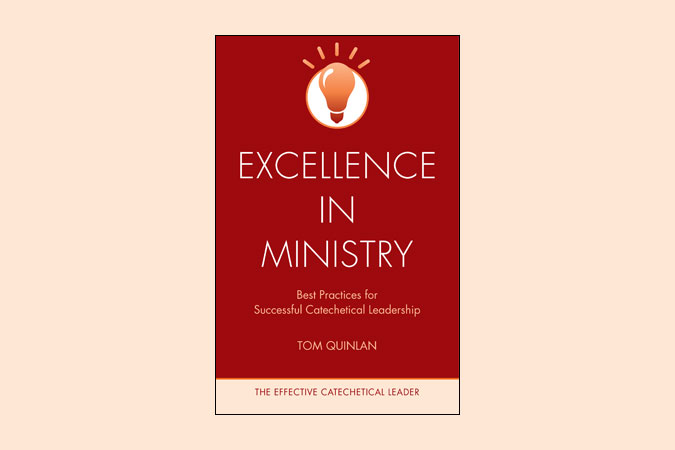Right before the holidays, I had the pleasure of enjoying a long, lazy lunch with my friend Tom Quinlan, Director of the Religious Education Office for the Diocese of Joliet and author of Excellence in Ministry: Best Practices for Successful Catechetical Leadership, part of the Effective Catechetical Leader series from Loyola Press and NCCL. Over a period of almost three hours, Tom and I chatted about a myriad of issues related to our shared passion—the catechetical ministry—as we attempted to solve all of the world’s (or, at least, the Church’s) problems!
Part of our shared passion is exploring approaches to faith formation that break out of the old “drop-off” model that is becoming increasingly ineffective. With that in mind, I share with you what I believe is one of the most important lines in Tom’s book, if not in the whole Effective Catechetical Leader series: “Faith-formation ministry needs to be not so much about catechizing children as about evangelizing households.” That sentence is so key that even Tom instructs his readers to read it twice! Tom goes on to clarify his point by saying, “Please note that this paradigm shift is not, ultimately, just about getting parents to value their children’s faith more deeply. It’s about getting parents to experience Catholic faith more deeply—in themselves!”
Here are just a few of the myriad of suggestions that Tom offers in his book:
- Resource (to evangelize and catechize) parents in the digital world, where they live, on their computer and smartphone. Through e-mail, Facebook, Twitter, and next-generation technologies, feed them short snippets of good Catholic content to guide them in their prayer, in their understanding and articulation of Catholic faith, and in their role as primary catechists. Be generous in your use of video clips.
- Resource parents beyond strictly faith themes. Our goal is always to demonstrate how life and faith can be intimately interwoven. Learn what are the greatest challenges and needs of parents and families today. Then provide resourcing assistance with an intentional faith spin to it (which you may have to insert yourself)…
- Weave into the matrix of family formation offerings, especially in the early grades, some parent coaching sessions. This can give parents hands-on guidance and practice in being the primary faith catechist for their child…
- Create family tote bags with a set of materials designed for family prayer, discussion, and games. The materials for family use can include
- liturgical-color cloth
- crucifix, cross, image of Jesus
- holy water
- family faith game
- conversation-starter cards
- faith journal for the week
- resources for family (DVD, CD, booklet)
- resource for parents (book on Catholic spirituality, the Mass, basic teachings, etc.)
- Invite (and yes, require) families to participate in some aspects of the life of the parish. Build into your program a joyful expectation of engagement in the parish. Create a menu of happenings in the parish, and ask them (at the start of the year) to select the ones they will commit to doing as a family…
- Offer adult faith-formation experiences during religious-education sessions. Invite (and keep inviting!) parents to join together for one or more modes of learning and sharing faith. Some will prefer watching a video series with a little discussion afterwards. Others may prefer a Lectionary-based faith-sharing group. Provide hospitality and an adult catechist to facilitate a group, and then see what happens. It may be slow to gain traction, but that’s okay. Stay the course. Those who participate will benefit from it and may tell their friends. Don’t be afraid to open this up to parishioners as a whole (unless that will scare off the parents).
This is just the tip of the “iceberg of ideas” that Tom Quinlan shares for evangelizing households in his book Excellence in Ministry: Best Practices for Successful Catechetical Leadership, which I highly recommend.
But, if you plan on having lunch with Tom, be sure to block out half a day, because the man is full of ideas!





Be the first to comment